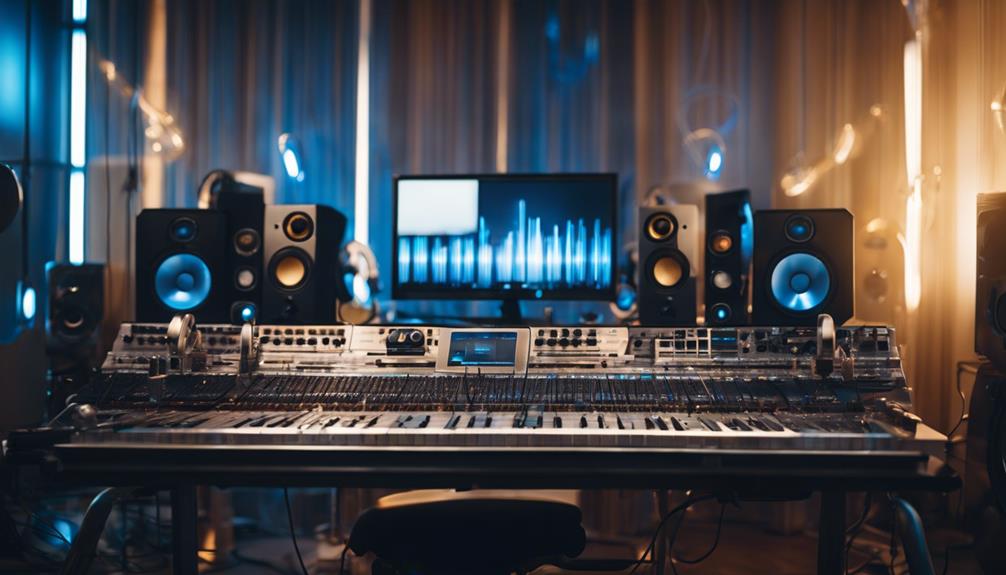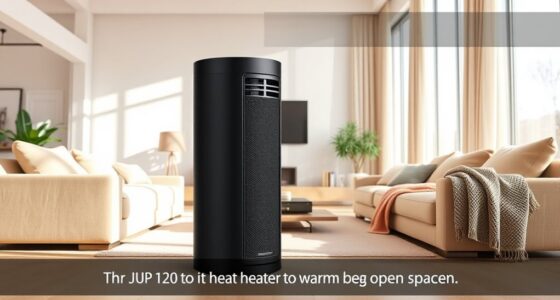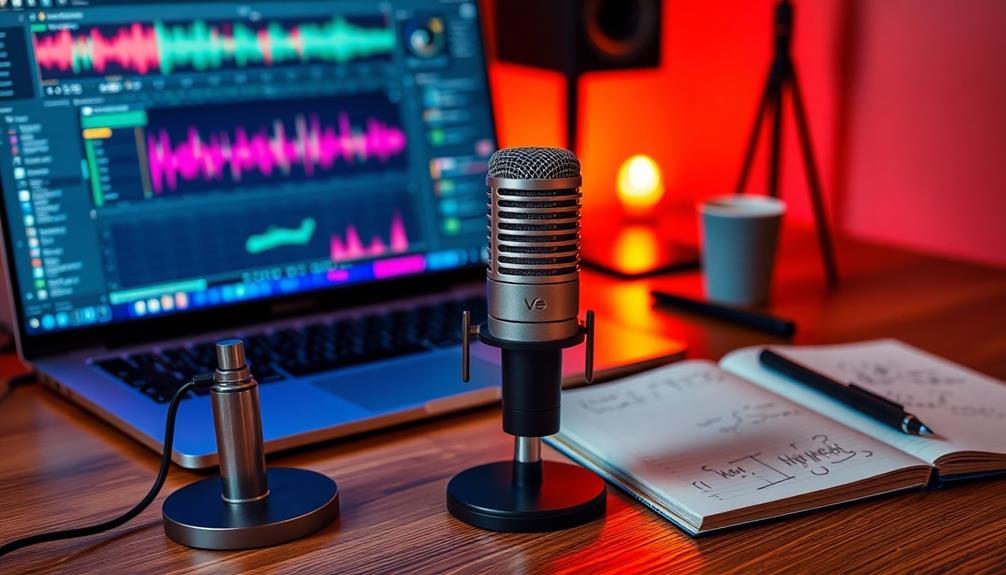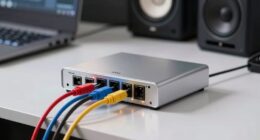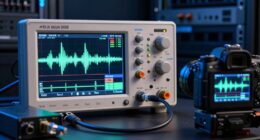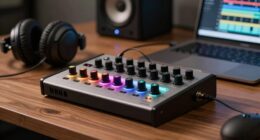When it comes to music production, a powerful studio tower is essential to elevate my sound. I need a machine that can handle demanding digital audio workstations and multiple tracks. The Dell Precision 3620 Music Production Workstation PC, with its Intel i7-6700 4-Core 3.4GHz CPU and 32GB DDR4 Memory, is a great option. Similarly, the Dell Precision T5810 Workstation, featuring an Intel Xeon E5-1650 v4 6-Core processor and 32GB DDR4 RAM, provides exceptional processing power. Other notable mentions include the Dell Precision 3620 Tower Computer (Renewed) and the HP Z420 PC for Music Production (Renewed). To find the perfect tower for my music production needs, I'll consider factors like processor power, RAM and storage, graphics, and connectivity.
Key Takeaways
- For music production, opt for towers with Intel Core i7 or Xeon series processors with high clock speeds and multi-core capabilities.
- Ensure ample RAM capacity (32GB or more) and fast SSD storage (512GB or more) for efficient data access and multitasking.
- A dedicated graphics card with sufficient memory (6GB or more) is crucial for rendering software interfaces efficiently and handling visual demands.
- Multiple USB ports, audio output options, and built-in Wi-Fi or Ethernet connectivity are essential for seamless connectivity and internet access.
- Choose an operating system (Windows, Mac OS, or Linux) that supports your preferred digital audio workstation and guarantees smooth music production.
Dell Precision 3620 Music Production Workstation PC

For music producers seeking a powerful and efficient workstation, the Dell Precision 3620 Music Production Workstation PC stands out as a top choice. It boasts an Intel i7-6700 4-Core 3.4GHz CPU and 32GB DDR4 Memory to tackle demanding music production tasks with ease. This workstation's impressive processing power, coupled with its ample memory, allows for seamless multitasking and rapid rendering of complex audio files.
The Intel HD Graphics 530, with two Display Port and one HDMI connections, guarantees high-quality visual output. Additionally, the workstation comes with a 512GB SSD and a 2TB HDD, providing ample storage for projects and files. With Windows 10 Professional 64-bit operating system, this workstation is optimized for music production, making it an excellent choice for professionals and enthusiasts alike.
Best For: Music producers, professionals, and enthusiasts seeking a powerful and efficient workstation for demanding music production tasks.
Pros:
- Impressive processing power with Intel i7-6700 4-Core 3.4GHz CPU and 32GB DDR4 Memory for seamless multitasking and rapid rendering of complex audio files.
- Ample storage with 512GB SSD and 2TB HDD for projects and files.
- High-quality visual output with Intel HD Graphics 530 and multiple display connections.
Cons:
- Some issues reported with hard drives and video output.
- Mixed feedback on quality and functionality.
- Potential issues with packaging and potential defects.
Dell Precision T5810 Workstation

For music producers seeking a powerhouse workstation that can handle demanding tasks with ease, the Dell Precision T5810 Workstation stands out with its Intel Xeon E5-1650 v4 6-Core processor, capable of reaching speeds of up to 4.0GHz.
This processing power is backed by 32GB of DDR4 RAM, ensuring seamless performance even with multiple applications open.
Storage is also plentiful, with a 1TB NVMe M.2 SSD and a 3TB HDD, providing ample space for files and projects.
The Nvidia GeForce GTX 1060 6GB graphics card handles graphics-intensive tasks with ease, making this workstation ideal for music production, gaming, and studio work.
With a 685W PSU and Windows 10 Professional 64-bit OS, this renewed product with warranty is a reliable choice for music producers.
Best For: Music producers, gamers, and studio professionals who require a powerful and reliable workstation for demanding tasks.
Pros:
- Powerful Intel Xeon E5-1650 v4 6-Core processor with up to 4.0GHz speed
- Ample storage with 1TB NVMe M.2 SSD and 3TB HDD, ideal for large files and projects
- Reliable performance with 32GB DDR4 RAM and Nvidia GeForce GTX 1060 6GB graphics card
Cons:
- Some users experienced initial booting issues, although resolvable
- Mixed feedback on packaging and protection during shipping
- No specific mention of display or monitor details, which may be important for some users
Dell Precision 3620 Tower Computer (Renewed)

For music producers seeking a powerful and reliable tower computer, the Dell Precision 3620 Tower Computer (Renewed) stands out with its Quad Core i7-7700 3.6GHz CPU, 32GB DDR4 RAM, and 1TB NVMe SSD storage, making it an ideal choice for demanding music production tasks.
I'm impressed by its technical specifications, which include a 3.6 GHz core_i7 processor, 32 GB DDR4 RAM, and a 1000 GB SSD hard drive. The dedicated NVIDIA graphics card with 0.5 GB of memory is also a notable feature.
Running on Windows 10 Pro, this tower computer is well-suited for music production software. Although some customers have mentioned issues with the power supply and digital output, the overall customer reviews are positive, with a 4.6 out of 5-star rating.
Best For: Music producers seeking a powerful and reliable tower computer for demanding music production tasks.
Pros:
- Powerful Quad Core i7-7700 3.6GHz CPU for efficient music production
- Ample 32GB DDR4 RAM and 1TB NVMe SSD storage for smooth performance
- Dedicated NVIDIA graphics card with 0.5 GB of memory for enhanced visual processing
Cons:
- Power supply may not be sufficient for heavy usage
- Digital output only for video card, limiting connectivity options
- Standard power supply is missing, which may be a inconvenience for some users
HP Z420 PC for Music Production (Renewed)

When it comes to music production, the HP Z420 PC's powerful 4-core Intel Xeon E5-1620 processor, paired with 32GB of memory and a 512GB SSD, makes it an ideal choice for professionals seeking a reliable and fast workstation that can handle demanding DAWs and multiple tracks with ease.
This renewed workstation tower boasts impressive specifications, including a 3.60GHz processor with a 3.80GHz turbo boost, ensuring seamless performance even with complex music production software.
The 32GB of DDR3 memory, upgradable to 64GB, provides ample space for running multiple applications simultaneously, while the 512GB SSD and 2TB HDD offer a perfect blend of speed and storage capacity.
With an Nvidia Quadro 600 graphics card and a 600W power supply, this HP Z420 PC is well-equipped to handle the demands of music production, making it an excellent addition to any studio setup.
Best For: Music production professionals and enthusiasts seeking a reliable and fast workstation for demanding DAWs and multiple tracks.
Pros:
- Powerful 4-core Intel Xeon E5-1620 processor with 3.60GHz base clock speed and 3.80GHz turbo boost for seamless performance
- Ample memory and storage capacity with 32GB of DDR3 RAM (upgradable to 64GB) and 512GB SSD + 2TB HDD
- Fast boot-up and connectivity options with multiple USB ports, DVD optical drive, and Nvidia Quadro 600 graphics card
Cons:
- Some users have reported power supply failure and issues with product appearance
- Limited upgrade options for the graphics card
- Heavy and bulky design with a weight of 34.9 pounds
Dell Optiplex 7040 Tower Desktop Computer

If you're a music producer seeking a reliable tower desktop for professional multitasking, the Dell Optiplex 7040 Tower Desktop Computer is an excellent choice. It boasts a Quad Core Intel i7 processor and 32GB of DDR4 RAM, enabling seamless performance ideal for web browsing, multimedia applications, and running popular productivity tools.
The combination of its powerful specs makes it a great option for music production and office work. The 500GB PCIe M.2 NVMe SSD and 2TB HDD provide ample storage for your projects, while the Intel HD Graphics 530 and Wi-Fi connectivity ensure smooth visuals and reliable internet access.
As a renewed product from a Microsoft Authorized Refurbisher, it comes with Windows 10 Professional pre-installed, guaranteeing a hassle-free setup. Its compatibility with various peripherals further enhances its usability. However, it may not be the best fit for high-performance gaming.
Best For: Music producers, office workers, and individuals who need a reliable tower desktop for professional multitasking, web browsing, and multimedia applications.
Pros:
- Powerful performance with Quad Core Intel i7 processor and 32GB of DDR4 RAM
- Ample storage with 500GB PCIe M.2 NVMe SSD and 2TB HDD
- Comes with Windows 10 Professional pre-installed, ensuring a hassle-free setup
Cons:
- May not be suitable for high-performance gaming
- Some users have reported noise levels and minor damages
- Limited Wi-Fi connectivity with 802.11n standard
Dell Precision T1700 Workstation

When I need a workstation that can handle demanding music production tasks with ease, the Dell Precision T1700 Workstation, with its Intel Quad-Core i7 4770 processor and 16GB DDR3 memory, becomes my top choice.
This powerful machine is designed to tackle complex projects, and its 1TB SSD and 500GB HDD combination provides ample storage for my files.
The 4K 3-monitor support, via two DisplayPorts and one VGA port, allows me to multitask efficiently, and the USB 3.0 connectivity guarantees fast data transfer.
Running on Windows 10 Pro, this workstation provides a seamless and reliable operating system for my music production software.
While some users have reported issues with the power button and internal components, I'm impressed with the overall performance and features of the Dell Precision T1700 Workstation.
Best For: Music producers, video editors, and other professionals who require a powerful workstation to handle demanding tasks with ease.
Pros:
- Powerful performance with Intel Quad-Core i7 4770 processor and 16GB DDR3 memory
- Ample storage with 1TB SSD and 500GB HDD combination
- 4K 3-monitor support and USB 3.0 connectivity for efficient multitasking and fast data transfer
Cons:
- Some users have reported issues with the power button and internal components
- Mixed reviews on long-term performance and reliability
- Heavy and bulky design with a weight of 49.9 pounds
Dell Optiplex 9020 Small Form Factor Desktop PC

With its compact design and powerful Intel Core i7-4770 processor, the Dell Optiplex 9020 Small Form Factor Desktop PC is an ideal choice for music producers who need a reliable and space-saving workstation that can handle demanding music production software.
This small but mighty machine packs a punch with its 32GB of DDR3 RAM and 1TB SSD, guaranteeing seamless performance and fast data transfers. The Intel HD Graphics 4600 and support for multiple monitors make it perfect for multitasking and visual-heavy tasks.
I appreciate the variety of USB ports, including six USB 2.0 and four USB 3.0, which offer ample connectivity options for my music production gear. Additionally, the Wi-Fi and Bluetooth capabilities ensure effortless connectivity and collaboration.
Overall, the Dell Optiplex 9020 is a solid choice for music producers who require a powerful, compact, and reliable workstation.
Best For: Music producers who need a reliable and space-saving workstation that can handle demanding music production software.
Pros:
- Compact design with powerful Intel Core i7-4770 processor and 32GB of DDR3 RAM for seamless performance
- Ample connectivity options with six USB 2.0 and four USB 3.0 ports, as well as Wi-Fi and Bluetooth capabilities
- Support for multiple monitors and fast data transfers with 1TB SSD and Intel HD Graphics 4600
Cons:
- Issues with disk drive and warranty reported by some users
- Limited upgradability and expandability due to small form factor design
- Some users may find the price to be steep for the specifications and features offered
Dell Optiplex 7020 Desktop Computer

As music producers seeking a dependable workstation, I've found the Dell Optiplex 7020 Desktop Computer to be an excellent choice, thanks to its Intel Quad-Core i7-4770 processor and 32 GB RAM, which provide fast performance and ample power for most music production tasks.
The 512GB SSD guarantees quick loading times and responsive performance, making it ideal for demanding music production software. Additionally, the DVD, USB 3.0, WiFi, and HDMI features offer convenient connectivity options.
While some users have reported mixed experiences with packaging and physical condition, as well as occasional connectivity issues, the overall feedback suggests that this desktop computer is reliable and efficient.
With its easy upgradeability and potential for adding low-profile graphics cards, the Dell Optiplex 7020 is a great value for its price, making it an excellent addition to any music production studio.
Best For: Music producers, students, and engineers who need a reliable and efficient workstation for demanding tasks.
Pros:
- Fast performance with Intel Quad-Core i7-4770 processor and 32 GB RAM
- Ample storage and quick loading times with 512GB SSD
- Easy upgradeability and potential for adding low-profile graphics cards
Cons:
- Mixed experiences with packaging and physical condition
- Occasional connectivity issues with WiFi and HDMI
- Some users experienced slow download speeds and concerns about hardware failures
HP EliteDesk 800 G4 Desktop PC with Monitor

For music producers seeking a reliable and powerful workstation, the HP EliteDesk 800 G4 Desktop PC with Monitor stands out as a top choice. It boasts an Intel Core i7-8700 processor and 16GB of DDR4 RAM, providing ample processing power to handle demanding music production tasks efficiently without any lag or crashes.
The 256GB SSD and 1TB HDD storage combo offer enough space for projects, samples, and plugins. The integrated graphics card and 16GB RAM ensure smooth performance. The 23.8-inch FHD LCD monitor included provides an excellent visual experience, ideal for mixing and mastering.
With its compact design and all-inclusive package, including a USB Wi-Fi adapter, mouse, and keyboard, this renewed product is an excellent value for music producers looking for a reliable and high-performance workstation.
Best For: Music producers seeking a reliable and powerful workstation for efficient music production, mixing, and mastering. This workstation offers seamless performance and comes equipped with advanced features tailored to enhance creativity and workflow. Its compatibility with the best TVs for music production ensures a more immersive visual experience when working on detailed sound design or tracking projects. Additionally, its robust build and high processing power make it an essential tool for both amateur and professional music producers alike.
Pros:
- Powerful processing capabilities with Intel Core i7-8700 processor and 16GB DDR4 RAM for handling demanding music production tasks
- Ample storage space with 256GB SSD and 1TB HDD combo for storing projects, samples, and plugins
- Excellent visual experience with the included 23.8-inch FHD LCD monitor, ideal for mixing and mastering
Cons:
- Renewed product, which may be a concern for some buyers who prefer brand new products
- No dedicated graphics card, which may limit its performance for graphics-intensive tasks
- Weight and size of the desktop PC may be a concern for those with limited desk space
Atlantic Onyx Wire CD Tower – Holds 80 CDs in Matte Black Steel, PN 1248

If you're a music producer seeking a sleek, space-saving solution to store your extensive CD collection, the Atlantic Onyx Wire CD Tower is a top contender, boasting an impressive 80-CD capacity in a sturdy, matte black steel design.
This tower's efficient design allows it to be wall-mounted or freestanding, making it a versatile addition to any music production studio. I appreciate that it's constructed with heavy-gauge steel, ensuring durability and stability.
Plus, the compact and lightweight design makes it easy to transport. With no tool assembly required, I can have it set up and ready to use in minutes.
The dimensions are 12.88'L x 11.00'W x 48.50'H, and it weighs a manageable 8 pounds. Overall, the Atlantic Onyx Wire CD Tower is a reliable and functional storage solution for music producers.
Best For: Music producers and collectors seeking a space-saving, durable, and easy-to-assemble CD storage solution.
Pros:
- Holds 80 CDs in a compact and efficient design
- Constructed with heavy-gauge steel for durability and stability
- No tool assembly required, making it quick and easy to set up
Cons:
- Some users have reported issues with stability and assembly
- May require additional support for added stability
- Compact design may not be suitable for larger CD collections
Samsung MX-ST90B Sound Tower High Power Audio

With its 1700W high power audio and bi-directional speakers, the Samsung MX-ST90B Sound Tower is an ideal choice for those who want to create an immersive audio experience that can energize a large crowd.
As a music producer, I appreciate the tower's ability to deliver rich sound with its karaoke mode and bass pumping capabilities. The IPX5 water-resistant feature guarantees that I can use it outdoors, rain or shine, making it perfect for year-round entertainment. I also like that it comes with wheels, making it easy to transport to different locations.
Additionally, the Bluetooth multi-connection feature allows me to connect two devices simultaneously, and the group play feature enables me to connect up to 10 Samsung sound towers for an even more powerful audio experience. The Sound Tower App, compatible with Android and iOS devices, provides convenient control over the tower's features.
Best For: Music enthusiasts, party hosts, and outdoor event organizers who need a high-power audio solution with advanced features and durability.
Pros:
- Delivers rich and immersive sound with 1700W high power audio and bi-directional speakers
- Offers versatility and convenience with Bluetooth multi-connection, group play, and IPX5 water-resistant features
- Provides an enhanced ambiance with party lights and karaoke mode, making it perfect for outdoor and indoor events
Cons:
- Some users have reported mixed feedback on the Samsung app control and bass response
- Volume limitations have been reported by some users
- The product is relatively heavy and bulky, weighing 54 pounds, which may make it difficult to transport without the wheels
Atlantic Nestable 100 CD Tower

This Atlantic Nestable 100 CD Tower stands out as a top choice for music producers who need a space-saving solution to store their extensive CD collections, thanks to its efficient design that can hold up to 100 discs.
I appreciate that it's made of heavy-gauge steel, which guarantees durability and stability, and its gunmetal finish gives it a sleek, professional look. The tower's dimensions, 11.13 inches wide, 8 inches deep, and 31.75 inches high, make it a great fit for any office or studio.
What's more, it requires no assembly, so I can get started organizing my CDs right away. With its sturdy extended base and efficient design, this tower is a great option for anyone looking to maximize their storage space without sacrificing style or functionality.
Best For: Music producers and collectors who need a space-saving solution to store their extensive CD collections.
Pros:
- Made of heavy-gauge steel for durability and stability
- Efficient space-saving design that can hold up to 100 CDs
- No assembly required, making it easy to set up and use
Cons:
- Some customers have reported that the tower is flimsy and unbalanced
- Design flaws have been noted by some customers
- May not be as sturdy as some users would like
Dell Optiplex 9010 SFF Desktop Computer

Those seeking a powerful and compact music production workstation will appreciate the Dell Optiplex 9010 SFF Desktop Computer, which packs an Intel i7-3770 processor capable of reaching speeds up to 3.9GHz. This processing power is complemented by 32GB of DDR4 RAM and a 1TB SSD, guaranteeing smooth performance even with demanding music production software.
The AMD Radeon 1GB Graphics card provides reliable graphics processing, while the Windows 10 Pro operating system guarantees a seamless user experience. With a range of connectivity options, including DisplayPort, HDMI, DVI, and Wi-Fi, I can easily connect my music production gear and peripherals.
Although some users have reported issues with USB 3.0 ports and display ports, I'll make sure to thoroughly check the product upon delivery and be prepared for potential setup challenges.
Best For: Music production professionals and enthusiasts seeking a powerful and compact desktop computer for their creative needs.
Pros:
- Fast performance with Intel i7-3770 processor and 32GB DDR4 RAM
- Reliable graphics processing with AMD Radeon 1GB Graphics card
- Compact design with multiple connectivity options, including DisplayPort, HDMI, DVI, and Wi-Fi
Cons:
- Some users have reported issues with USB 3.0 ports and display ports
- Hard drive failure has been reported by some users after a year of use
- Missing cables and parts have been reported by some customers upon delivery
Dell OptiPlex 7040 Tower Desktop Computer

I need a computer that can handle demanding music production tasks, and the Dell OptiPlex 7040 Tower Desktop Computer's Intel Quad Core i7-6700 processor, capable of reaching up to 4.0GHz, makes it an ideal choice for professionals like me.
This tower desktop computer is designed to deliver high-performance processing, making it perfect for music producers who require robust processing power to handle multiple tracks, effects, and plugins.
With 16GB of DDR4 RAM and a 1TB hard drive, I can store and access my files quickly, guaranteeing a seamless workflow.
The computer's WiFi and Bluetooth connectivity options, along with its 4K support and multiple display ports (DP and HDMI), provide flexibility and convenience.
As a music producer, I appreciate the Certified Refurbished product's minimum 90-day warranty, which assures that I can rely on this desktop to get the job done.
Best For: Professionals and individuals who require high-performance processing for demanding tasks such as music production, content creation, and gaming.
Pros:
- High-performance processing with Intel Quad Core i7-6700 processor up to 4.0GHz
- Ample storage and memory with 16GB DDR4 RAM and 1TB hard drive
- Versatile connectivity options with WiFi, Bluetooth, 4K support, and multiple display ports (DP and HDMI)
Cons:
- May require additional hardware upgrades for specific tasks such as gaming or content creation
- Weight and size may be a concern for those with limited desk space (16.02 pounds, 13.8 x 6.1 x 10.8 inches)
- Limited warranty period of 90 days, which may not be sufficient for some users
Dell OptiPlex Desktop PC with RGB Keyboard Mouse and Headset

Boasting a powerful Intel Core i7 Quad-Core Processor and 16GB RAM, the Dell OptiPlex Desktop PC with RGB Keyboard Mouse and Headset is an ideal choice for music producers who require seamless multitasking and fast data processing.
This refurbished desktop PC comes with a 24-inch HDMI monitor, WiFi connectivity, and a Windows 10 Pro operating system, making it perfect for remote learning and everyday tasks.
The Intel Core i7 Quad-Core Processor, which clocks in at 3.40 GHz, guarantees fast booting and storage with its 512GB SSD.
Additionally, the integrated Intel HD Graphics 4600 provides a smooth gaming experience, although some users have reported limitations in recording gaming videos.
The RGB LED light panel with a remote controller adds a touch of personalization to the setup.
Overall, this desktop PC is well-suited for music production, offering efficient performance and reliable connectivity.
Best For: Music producers and individuals who require seamless multitasking, fast data processing, and reliable connectivity for remote learning and everyday tasks.
Pros:
- Powerful Intel Core i7 Quad-Core Processor and 16GB RAM for efficient performance and multitasking
- Fast booting and storage with 512GB SSD and integrated Intel HD Graphics 4600 for a smooth gaming experience
- RGB LED light panel with remote controller for personalized setup and added aesthetics
Cons:
- Mixed feedback on monitor quality and graphics performance, with some users reporting limitations and issues
- Reports of missing pieces, slow performance, and noise, leading to returns and refunds
- Limited upgrade options due to compact design, which may not be suitable for users with specific needs or requirements
Factors to Consider When Choosing a Tower for Music Production

When selecting a tower for music production, I prioritize several key factors to guarantee my system can handle demanding tasks.
First, I consider the processor's power, as it directly impacts the speed and efficiency of my workflow.
Additionally, I think about the amount of RAM and storage I need, as well as the importance of a dedicated graphics card, connectivity options, and the choice of operating system.
Processor Power Matters
As I immerse myself in music production, I quickly realize that processor power is a critical factor that directly impacts the speed and performance of my tasks.
When choosing a tower for music production, I know that the processor's power is paramount. I look for a tower with a powerful processor like Intel Core i7 or Xeon series, which can handle the demands of music production software efficiently.
A higher clock speed, such as 3.4GHz or higher, is also essential for faster processing of audio tracks and effects. Additionally, I opt for multi-core processors like quad-core or higher, which are beneficial for running multiple tasks simultaneously in music production.
Moreover, I make sure that the processor supports hyper-threading, which is essential for improved multitasking capabilities, especially in complex music projects.
RAM and Storage Needs
With my processor power in check, I now focus on guaranteeing my tower has sufficient RAM and storage to handle the demands of music production. As I work on complex projects, I need a tower that can support multiple audio tracks, virtual instruments, and effects running simultaneously. This necessitates a significant amount of RAM, so I look for a tower with ample RAM capacity and expandability options to accommodate future upgrades.
Storage is another critical factor, as I need to store large audio files, sample libraries, project files, and software applications. A tower with fast SSD storage is vital, as it ensures quick access to data and faster loading times for my music production software. I also consider the overall storage capacity, opting for a tower with plenty of space to store my growing library of files.
Graphics Card Importance
I prioritize a dedicated graphics card in my tower, recognizing its critical role in handling the visual demands of music production software and plugins.
As I explore further into music production, I've come to realize that a high-quality graphics card is essential for rendering high-quality visual interfaces of music production software. This enables me to work efficiently, with multiple monitors supporting my workflow management and multitasking.
Additionally, graphics cards with higher memory capacity can greatly enhance performance when working with large audio files and plugins. I've noticed that the choice of graphics card can greatly impact the overall speed and efficiency of music production software and plugins.
With a powerful graphics card, I can focus on creating complex audio processing tasks without worrying about my system slowing down. By investing in a reliable graphics card, I can guarantee that my tower is optimized for music production, allowing me to produce high-quality music without any technical hindrances.
Connectivity Options Count
Ten essential connectivity options can make or break the music production experience, and it's crucial to get them right when choosing a studio tower. As I set up my music production studio, I prioritize towers with sufficient USB ports to connect my MIDI controllers, audio interfaces, and external hard drives.
Multiple audio output options like HDMI, DisplayPort, and dedicated audio jacks are also a necessary requirement, allowing me to seamlessly connect to my studio monitors or headphones. Built-in Wi-Fi or Ethernet connectivity guarantees I can access the internet and collaborate with others online without any hiccups.
I also look for Bluetooth capability to connect wireless peripherals like keyboards, mice, and headphones, keeping my workspace clutter-free. Additionally, I evaluate the tower's expansion slots and compatibility with additional audio cards, graphics cards, or storage upgrades to cater to my evolving music production needs.
Operating System Choice
When it comes to music production, the operating system of my studio tower plays a critical role in guaranteeing software compatibility and stability, making it essential to choose the right one for my specific needs.
As a music producer, I need an operating system that can support my preferred digital audio workstation (DAW) and plugins. Windows is a popular choice among music producers due to its wide range of software support and flexibility. Many music professionals, however, favor Mac OS for its intuitive interface and optimized performance with certain audio software. Linux is another viable option, offering customization and open-source software advantages.
When selecting an operating system, I consider the specific DAW and plugins I use. For instance, if I'm using Ableton Live, I may prefer Windows or Mac OS, while Linux might be a better fit for those using open-source DAWs like Ardour.
Ultimately, the right operating system guarantees seamless music production, and I must weigh the pros and cons of each option to make an informed decision.
Noise Level Considerations
A critical aspect of choosing a studio tower for music production is selecting one that minimizes noise levels, guaranteeing an undisturbed recording environment.
As a music producer, I know that excessive noise can be a major distraction, interfering with the audio recording process and affecting the overall quality of my work. To avoid this, I look for towers with efficient cooling systems that prevent excessive fan noise during music production.
Additionally, I opt for towers with noise-reducing features or sound-dampening materials that maintain a quiet environment. I also check user reviews, paying close attention to mentions of the tower's noise levels, to make an informed decision.
It's imperative to make sure that the tower's components and fans are designed to operate quietly, creating a conducive music production setup. By considering these factors, I can focus on creating high-quality music without distractions, resulting in a better overall sound.
Budget Constraints Impact
It's crucial to work within my budget constraints when choosing a studio tower for music production, as overspending can drain my resources and compromise my creative freedom.
Evaluating the features and specifications of a tower in relation to its cost is vital to determine if it offers value for my budget. I need to look for cost-effective options that provide the necessary performance and capabilities for my music production needs.
Comparing the prices of different towers helps me find the best balance between affordability and functionality. While higher-priced towers may offer advanced features, they may not always be necessary if they exceed my budget limitations.
Prioritizing my needs and weighing the benefits of each feature against the cost is key. By doing so, I can find a tower that meets my requirements without breaking the bank.
Ultimately, it's about finding a tower that aligns with my financial limits, providing the necessary tools to elevate my sound without compromising my artistic vision.
Frequently Asked Questions
Can I Use a Gaming Tower for Music Production?
I've wondered if I can use a gaming tower for music production, and honestly, it's doable, but it may not provide the best performance and storage I need for demanding music production software.
Do I Need a Large Tower for Professional Music Production?
"As I imagine a music production Empire State Building, I realize I don't need a massive tower to reach new heights. A compact, powerful studio tower with optimized components can produce professional-grade sound, no skyscraper required."
Are Tower Computers With SSDS Better for Music Production?
Honestly, I think tower computers with SSDs are a game-changer for music production – they boot up quickly, load plugins fast, and offer snappy performance, making my workflow so much smoother.
Can I Upgrade My Tower's RAM for Music Production?
'I'm hitting a wall with my music production, and I'm wondering if upgrading my tower's RAM is the solution. Thankfully, the answer is a resounding yes – adding more RAM can greatly enhance my system's performance.'
Is a Tower's Processor Speed Important for Music Production?
Honestly, I believe a tower's processor speed is essential for music production. A fast processor handles multiple tracks, plugins, and effects smoothly, ensuring my creativity flows uninterrupted.
Conclusion
Elevating your music production game requires the right tools, and a reliable tower is the backbone of your setup. Choosing the perfect one can be overwhelming, but by considering factors like processing power, RAM, and storage, you'll be well on your way to creating hits.
Think of it like building a skyscraper – a strong foundation is essential for reaching new heights. With the right tower, your music will soar like a bird taking flight.

